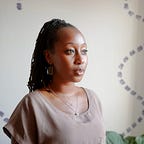Afropean Conference and Copenhagen Jazz Fest: Blackness Personified in Europe
“You don’t have understand it. Go home.” -Yomi Sode, Black British Poetry Night at the Afropean Festival 2017 and Fest Afrika 2017
In the beginning of July I headed back to Finland (I was there last summer) for the Afropean Conference, which was hosted by the University of Tampere. This biennial conference focuses on Black Europe, Black people in Europe, and Africans/African identity in Europe more generally. As always, there are too many things to highlight about the conference. Paul Gilroy was the keynote speaker who opened the conference. He spoke about many things which included: Grenfell tower, movements versus networks, his skepticism around social media, and the transformation of racism and racist attitudes — with wonderful sarcastic cynicism he stated “Apparently there are no more racists anymore.” From panels on ‘taking up space’ to ‘decolonizing the museum,’ the insight and relevance of the work of the Black scholars, artists, activists I met there is unparalleled and refreshing — if not truly inspiring.
I curated and chaired a session, “Geographies of Blackness in European cities: Performing Africanness Through Art and Activism.” It went extremely well and seemed to resonate with many people. The first speaker in my session was an Italian woman who spoke about and problematized how Italian women who do West African dance connect it with primitivity, freedom, wildness and associate the teachers (always African men) with repressed desire and sexuality. The second speaker, a Black American who’s currently doing his PhD at UCLA, talked about the art and activism of the very huge Notting Hill (Caribbean) Carnival. The third speaker, Melanie, produced a comedic performance in Switzerland responding to a racist/anti-Black Swiss commercial. The final speaker, Kamal, talked about Afro-French conscious rap and the new movements in this genre that are show solidarity with Palestine. I’m hoping to create an anthology where each of these talks can be expanded upon and maybe other research that fits in with this theme can be included.
Saturday evening once the conference ended I took a train back to Helsinki, where I spent the night before heading to Copenhagen for the Copenhagen JazzFest. Northern Europe, and the communities I have here, has a special place in my heart so going from the Afropean conference in Finland to seeing friends in Copenhagen is only a testament to my feelings about this region of Europe.
A friend of mine curated a week of performances for the JazzFest which are not traditional music or jazz performances; such as talks, poetry, dance… all taking place at a cafe/bar which doubles as a cultural center. There was a talk by Ethelene Whitmire, who studies Black Americans in Copenhagen in the 20th century. Her talk focused on Black American jazz musicians in Copenhagen, their experiences, legacies, and the music communities they created. Black American artists and arts have a long history in Europe with Paris and Copenhagen mostly being the hubs. There is still a love of and support for Black Americans as artists and musicians in Europe even while other Black communities are treated poorly and unequally (such as Maghrebians, West Africans, East Africans, etc).
After Ethelene’s talk followed poetry performances by Ghanaian poet Kwame Aidoo, whose work focuses on African folklore and symbolism, and a good friend of mine Adelina — who also goes by Ayun. Kwame’s performance, entitled Queue To The Tap Dance, was an exploration of water and our bodies’ relationship to it. With video imagery from Paris and Accra (the two cities where he is based) behind him and buckets at his feet, he vocally mapped the different manifestations of water and its role in history, present society, and the reality of scarcity.
Adelina — Ayun came ready to challenge the status quo and make people who are usually the majority reflect on their position. She aptly articulates the layers of pain and trauma as a Black person on the continent of Africa and in Europe. She simultaneously celebrates Blackness and makes any violence towards Black people or Black bodies feel foolish and inferior. She writes for us while living on a continent where we are relegated to the periphery. Her work is precise and important. It was a well-curated follow up to Kwame’s work which is centered on exploring our relationship to our environment in order to better understand the Afro-Future.
The next day, thanks to my sister being a friend of his, I go to see drummer Ulysses Ownens Jr. and pianist Christian Sands perform.
They are exceptional, serious jazz musicians and it’s clear why the Danish musicians who played with them were in awe. The precision, passion, and ease with which both of them played jazz music was a sight to behold. The creativity and improvisation felt original, but at the same time new and reinvigorated. In my humble opinion, knowing very little about jazz — only being close to it through my father’s love of jazz music and knowledge of jazz history, these two are the young contemporary jazz greats.
This last week has been full of both affirming and contesting Blackness in Black spaces, Black adjacent spaces, and spaces that become Black through our presence. It has been an immersion in the personification of Blackness through art, culture, academia, conversations, and encounters. It has made Europe a Black place for me, even if temporarily. This Blackness, I dare say, has made Europe a more interesting and accessible place for many of us who are normally peripheralized. From the Afropean Conference to the Copenhagen JazzFest, this week has been amazing for Black culture. My feelings can be best summed up in a quote by Maya Angelou; in my opinion the “mission in life is not merely to survive, but to thrive; and to do so with some passion, some compassion, some humor, and some style.”
